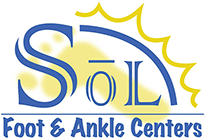(1).jpg)
There is often debate about whether deformities of the feet are hereditary or are caused by improper shoes. It’s probably best to say it like this: The tendency to develop deformities of the feet is usually hereditary (or even congenital – you’re born already having the deformity), but the severity of the deformity can definitely be worsened by not using proper shoes. Here is a basic description of some common foot deformities with links to get more information.
Whether or not your deformity should be fixed depends on how severe it is and how much it bothers you. Either way, your deformity should be evaluated to determine the treatment options and how likely it is to get worse. Schedule an appointment today to get a complete evaluation of your foot condition.
What is a Bunion?
A bunion is a bone prominence along the inside of the base of the great toe. Bunion formation is hereditary and can be aggravated by tight-fitting shoes. The bone prominence usually develops as the big toe moves toward the second toe. Bunion deformities can make it very difficult to find shoes that fit properly without causing pain.
What are Bunionettes?
Bunionettes also called tailors bunions, are like bunions, but are located along the outside of the foot at the base of the small toe. The small toe itself usually becomes rotated and curls underneath the fourth toe next to it.
What are Hammertoes?
Hammertoes are deformities of the toes where they are bent downward and the joints. The “knuckle” on the top of the toe then tends to become prominent and is easily aggravated by shoes. This can result in the formation of a corn in the area, which can be very painful and require treatment.
What does it mean to have Flat feet?
Some people have feet with very low to almost non-existent arches that we call “flat feet”. Some people can do very well having flat feet, while others may develop significant problems such as arthritis or tendon problems caused by the abnormal alignment of the foot joints. Even if flat feet are not painful they should be evaluated, especially in children, to see if there might be a specific cause.
What does it mean to have a High arch (cavus) feet?
Feet with very high arches can also develop problems. High-arched feet do not distribute pressure as well and it can be challenging to find shoes that are comfortable. Like flat feet, very high-arched feet should be evaluated to determine the cause and if any treatment is necessary.
Related Article: Treatment with Custom Foot Orthotics
We know you probably do so much already to help others, but today, it's time to help yourself. With three Podiatry offices conveniently located in Long Beach, we are available to diagnose and treat your painful foot or ankle condition. Don't have time to come in during the work week? That's okay; we have Saturday appointments too!
Call 562-433-0478 today to schedule an appointment with our caring podiatrists.
(1).jpg)










